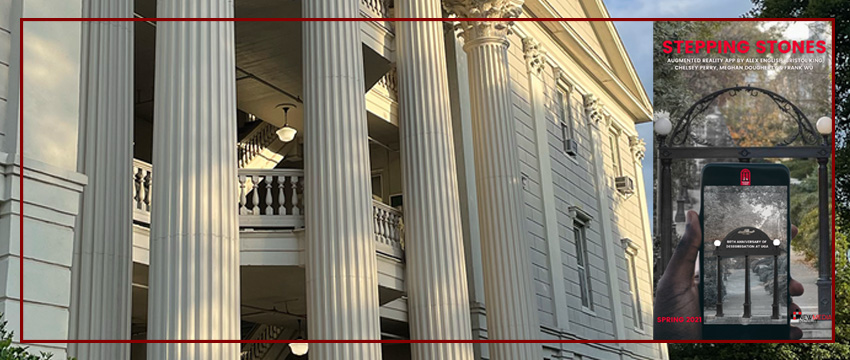Stepping Stones UGA app traces history-making paths of UGA desegregation

Stepping Stones UGA app traces history-making paths of UGA desegregation
Following the steps that Charlayne Hunter-Gault (ABJ ’63) and Hamilton Holmes took leading to the UGA Admissions Building…the terrifying night of riots at Myers Hall…and the refuge of the Killian House, are just a few of the scenes brought to reality through a new augmented reality iPhone app developed by a team of New Media Institute (NMI) students.
Stepping Stones UGA provides a tour of a few of the most significant scenes on campus and in Athens when Hunter-Gault and Holmes desegregated the university by enrolling as students in 1961. The app provides AR recreations of the way campus buildings and other Athens-area scenes looked in the early 1960s, along with maps of key sites and news clips of Hunter-Gault and Holmes stepping onto campus for the first time. The app can be used with geo-location while users interact with the app as they walk those same areas on campus, or it can be used remotely to understand UGA history.
Click above to view the Stepping Stones UGA app in action at The Arch.
The app was the vision of the Black Faculty and Staff Organization (BFSO) of UGA, which helped direct and partially fund the project. When Charles Davis, dean of Grady College heard about the project, he contributed some funds and introduced the organization to John Weatherford, NMI faculty and director of the NMI’s undergraduate capstone program.
“Because campus has changed and buildings have been renamed, we wanted to have a walking tour for historical purposes for the community,” said Susan Williams, current BFSO secretary and interim assistant dean for Diversity Equity and Inclusion at the Poultry Diagnostic and Research Center. “That way when folks come to campus, that would be an option to learn more about UGA.”
Weatherford knew this vision would be a great capstone project, especially since a similar app had been developed in prior years, but the technology advances had advanced so quickly that an even richer experience would now be possible.
The group started working with Maurice Daniels, dean emeritus at the School of Social Work, and co-founder and director of The Foot Soldier Project for Civil Rights Studies. Daniels helped research key stops to be included in the app like the UGA Arch, where Holmes and Hunter-Gault arrived on campus; what is now the Holmes-Hunter Building where they registered for classes; the Killian House where Holmes lived during his studies; Myers Hall, where Hunter-Gault lived; and the Athens Courthouse, where the lawsuit was filed approving Holmes and Hunter-Gault as students.
“Projects like this are very much at the heart of what NMI is all about,” Weatherford said. “We focus on applied real-world experiences that allow students to engage with and be more informed about the world around them. We always aim for experiential opportunities, but when we are able to add the additional layer of learning more about our institution, that elevates the students’ learning opportunity to a different level.”
Although the Stepping Stones UGA app is not part of his capstone project, a graduate student in the NMI’s Emerging Media masters program, Ryan Fernandez, stepped forward to help. Fernandez is co-founder of Alpha Design Studio, an Athens-based firm specializing in architectural 3D renderings, animation and virtual reality. He was able to study old pictures that were available, take measurements and create the scale replicas of the landmarks as accurately as possible.
In the case of the Killian House, a private residence that was torn down years ago, Fernandez only had two partial pictures of the house and had to create approximate renderings based on nearby homes of a similar architectural style.
“Recreating buildings with minimal information are things I do all the time,” Fernandez said. “The photos don’t show the detail very well, and without plans, recreating what I thought was going on is about the only way to do it.”
Chelsey Perry (AB ‘21) was one of the students who worked on the project. Perry had been on the team that produced a documentary by Grady College commemorating the 60th anniversary of Desegregation.
“As a black student at UGA it felt nice to know that the University was devoting resources to creating an app like this,” said Perry. “I had previously interviewed Charlayne Hunter-Gault as well as other notable Black UGA graduates for UGA’s 60th anniversary of Desegregation documentary, so it was wonderful synchronicity to be working on this project at the same time.”
In addition to Perry, other NMI students involved with the project included Meghan Dougherty, Alex English, Bristol King and Frank Wu.
The Stepping Stones UGA app is available for iPhone users and can be downloaded from the App Store.
Williams concluded by saying she believes there are a lot of people who work on campus, let alone visitors to campus, who don’t know details about this pivotal time in the university’s history.
“Maybe the app will show them that where they walk every day on campus has historical significance,” Williams said.